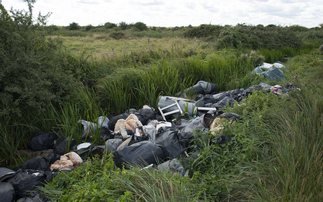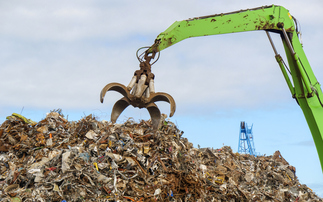
Partner Insight: Carbon capture and storage from energy from waste plants can help support a truly circular economy, writes enfinium CEO Mike Maudsley
For too long, we have relied on a linear model of consumption: make, use, and dispose. This approach has delivered convenience and economic expansion but at the cost of resource depletion and rising carbon emissions.
A circular economy is not just a waste management strategy; it is a blueprint for innovation and sustainable growth. By extracting the maximum value from every resource, the problem of waste is transformed into an opportunity.
Crucially, a circular economy also recognises that some waste is unavoidable but that none of it should be wasted. After all, waste can be a valuable resource. It contains energy, reusable materials and embodied carbon that can be extracted using the right technologies.
With a new government focused on creating a circular economy, fostering sustainable growth, and achieving net zero, the moment to act is now.
Although it may be surprising, given that I run a company in the business of waste management, I believe we must reduce the amount of waste we produce in the UK. Despite our best efforts over the previous 30 years, our society has never produced more waste.
There are complex reasons for this – a combination of consumer behaviour, manufacturing practices, rising consumption, and the complexities of recycling and waste management.
It is well understood that there is a link between waste and consumption. As societies become wealthier and their GDP increases, so too does their consumption - and with it, waste. This is a difficult link to break.
However, I believe that you can empower people to create less waste. For example, rather than merely instructing individuals to consume less, we should provide opportunities to take practical action – demonstrating how simple and rewarding it can be to reuse, repair and repurpose goods.
Introducing robust 'Right to Repair' legislation would support this shift, covering a broader range of products which can both benefit consumers and business. These measures, alongside policies like Extended Producer Responsibility and a nationwide Deposit Return Scheme, will support the reduction of waste.
My business, enfinium, have been providing grant funding to community Repair Cafés for this reason. These largely volunteer groups repair faulty household items free of charge, providing the communities they serve the chance to extend the life of cherished items and prevent waste heading to landfill.
However, reductions in waste can only go so far. The reality, unfortunately, is that there will always be some waste that cannot be prevented through repair, reuse or even recycling.
This is because there are limitations in recycling. Some materials cannot be recycled at all. Others will degrade over time and will eventually become unrecyclable. This is the second law of Thermodynamics: energy (matter) cannot be continually recycled without reducing its density or quality.
The reality is that ‘zero waste' is an aspiration and this hard truth is one we must face if we are to build a circular economy in practice.
To address this, we are proposing a new principle, alongside reducing waste, that can be the foundation of a circular economy: that zero waste is wasted.
‘Waste' can be a valuable resource. It contains important materials, energy, and embodied carbon – all of which, if treated in the right way, can be used to support wider circularity and decarbonisation goals.
To ensure that zero waste is wasted, there are a few steps we can take.
The most obvious is that we must stop burying waste in the ground. Landfill doesn't just take up space and is unsightly – it also produces vast amounts of methane, not all of which is captured. Methane is around 80 times more climate damaging than carbon dioxide. And, even with good containment, there is always a risk of soil and water contamination from leachate. For waste that cannot be recycled, landfill is not circular. It is the full stop of the linear economy.
Other countries around the world, including leaders in waste management such as the Netherlands and Belgium, recognised this fact a long time ago – introducing landfill bans in the 1990s. Yet here in the UK, the most recent data shows that we sent 13.1 million tonnes of waste to landfill.
The alternative to landfill is energy from waste. The UK has over 60 energy from waste facilities that currently turn unrecyclable waste into electricity. For every tonne of unrecyclable waste that enfinium processes, we generate 600kWh of energy. That's enough to power a home for two months.
Energy from waste plants – like the one we're currently building in Skelton Grange in Leeds – don't just generate electricity, they also produce heat. This can be supplied to nearby business through heat networks to support further heat decarbonisation, offering a reliable and sustainable alternative to fossil fuels.
In the future, we can go further. By implementing carbon capture and storage technology, we can capture carbon emissions produced during energy recovery - ensuring carbon released from unrecyclable waste doesn't end up in the atmosphere. This would ‘close the loop' for waste sector emissions and is something we're proud to be leading on.
Creating a circular economy will not be easy. It requires the combined efforts of the government, private sector, local communities, and individuals. It also requires recognising that no waste should be wasted – and to build a system capable of delivering on that.
Mike Maudsley is CEO at enfinium.
This article is sponsored by enfinium.







